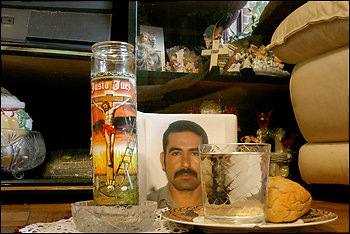Jury awards $11.5 million to family of Unresisting Latino Man Brutally Murdered by PG County Cop
/
From [HERE] and [HERE] A jury in Prince George’s County awarded $11.5 million to the widow and child of a man who was fatally shot by a police officer and found that the officer wrongfully caused the man’s death.
The jury also found that Cpl. Steven Jackson violated the consitutional rights of Manuel de Jesus Espina during an encounter in a Langley Park apartment building in August 2008. Jackson acted with malice and not in self defense, the jury found. The $11.5 million award is for compensatory damages. The jury is still deliberating about whether Espina’s family is entitled to punitive damages.
The money awarded to relatives of Manuel de Jesus Espina is believed to be the largest jury verdict in a case involving misconduct by a Prince George’s police officer, veteran civil rights lawyers said.
Espina, 43, was shot by Cpl. Steven Jackson in a Langley Park apartment building in August 2008, when Jackson was moonlighting as a security guard.
The jury of five women and one man found that Jackson intentionally violated Espina’s constitutional rights, that he acted with malice, that he did not act in self-defense, and that he assaulted and battered Espina before wrongfully killing him. Jackson pepper-sprayed Espina and beat him with his fists and a metal police baton before shooting him, according to court testimony and evidence. Jurors deliberated for 31 / 2 days.
Jackson, 27, who remains on paid administrative leave, did not visibly react as the verdict was announced. He declined to comment.
Espina’s son, Manuel de Jesus Espina Jacome, 24, who witnessed the shooting, said he did not care about the monetary award. “The money is not important,” he said. “He [Jackson] should be put on trial for the crime he committed.”
In a statement, State’s Attorney Angela D. Alsobrooks said her office and the Justice Department are reviewing the case. “We will make a decision as to whether we should proceed criminally in this matter,” Alsobrooks said in the statement.
Through a spokesman, acting police Chief Mark Magaw declined to comment, citing the possibility of criminal charges against Jackson.
But Timothy F. Maloney, an attorney for the Espina family, said Jackson should be held accountable. “The jury’s award recognizes the outrageous police misconduct in this case and its impact upon the Espina family,” he said. “The facts in this case should shock the conscience of the county and raise the question of who is policing the police.”
The fatal encounter occurred Aug. 16, 2008, when Jackson was providing security at an apartment complex on 14th Avenue.
Witnesses for the plaintiffs and Jackson gave starkly different accounts of the incident.
Jackson testified that he saw about a half-dozen men hanging out in front of a three-story building in the complex where he was working. Some of the men, including Espina, were drinking beer.
During the civil trial and in a sworn deposition, Jackson testified that none of the men was suspected of a crime, none had violated any loitering laws and none had committed an alcohol violation. None of them was behaving in a disorderly way, Jackson testified.
Jackson said he approached the men because he was concerned they might be blocking the entrance and to see whether any of them was involved in any wrongdoing. Jackson said that he encountered Espina on a second-floor landing and that when he tried to search him, Espina swung at him and became violent.
Four witnesses for the plaintiffs testified that Jackson pepper-sprayed an unresisting Espina and beat him down the stairs with his fists and a metal police baton. Eventually, the two men went into a basement apartment, where Jackson fired a single, fatal bullet. Two witnesses testified that a bloodied Espina was not fighting or trying to escape in the moments before Jackson shot him.
Daniel Karp, who defended the county and Jackson, said decisions made by Circuit Court Judge Albert W. Northrop contributed to the verdict.
“The county has no choice but to appeal this case because the trial judge would not allow the defense to introduce evidence of Mr. Espina’s illegal status or the fact he had a knife in his pocket at the time of the incident,” Karp said. “Both of these facts corroborate Officer Jackson’s testimony that Mr. Espina fought back and resisted arrest.”
Three jurors said they did not believe portions of Jackson’s testimony. They questioned, for example, Jackson’s account that he was surrounded by a “mob” of six or seven men who menaced him moments before he shot Espina.
The jury’s foreman, Alberta Fisher, 63, of Lanham, said Jackson’s account that Espina fought ferociously was not credible, given that Jackson was uninjured, except for some knuckle scrapes, while Espina suffered numerous cuts and bruises before he was shot.
“He needs to get some anger management,” Fisher said of Jackson. “God bless him. I’m not angry with him.”
Fisher said she thinks the shooting “will play in [Jackson’s] mind forever.”
Juror Theron Whitaker Jr., 43, of Cheverly said that Espina may have resisted arrest but that if he did, “he didn’t put up much of a fight.”






























































































































































































































































































